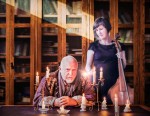Charles I of England, finding himself strapped for cash and having no way of raising funds, decided to prorogue Parliament for eleven years and rule England by divine right. This proved to be something of a bad idea, as an increasingly outraged aristocracy rebelled against the Crown, plunged the country into civil war for nine years, and had Charles beheaded.
Against this violent and chaotic background, England's cultural life should have ground to a halt, and although the period can hardly be described as a Golden Age (the artists of the time were more worried about staying alive than their own artistic development) it is nevertheless one of the most exotic periods in English music history. The English of the early mid-17th Century developed the rules of Renaissance composition so far as to be barely recognizable as Renaissance music, and while in (say) Italy, the new Baroque style featured new musical genres like opera and new techniques of composition like monody, and an independent bassline, the English had an eccentric and completely unique style of music quite unlike anything else in Europe.
It's repertoire that I would argue deserves to be performed more often, and I was glad to have the chance to hear Scaramella introduce Toronto audiences to the music of the English 17th Century last Saturday night at Victoria College Chapel. The program featured some excellent, hitherto-unknown composers that ought to be performed more often, including John Hingeston, Simon Ives, John Walsh, and Godfrey Finger.
Also on display were some eccentric English forms of the period. Lyra viol, a style of viola da gamba where the instrument plays full chords and is tuned in scordatura, was particular to England, and Ives's compositions for solo lyra viol were a much-appreciated part of the program. Theme and Variations (“Divisions on a Ground”) were also a favourite of the English, as were trio sonatas with continuo. Other strange beasts on display were the sonata by Henry Butler, with solo violin and viola da gamba parts, and the Jenkins fantasia, which had a lyra viol part as part of a chamber ensemble playing chords along with the organ. I'm happy to hear a Toronto-based taking a chance on some repertoire that's not a guaranteed crowd-pleaser and shedding some light on a turbulent period in history.
Scaramella's next concert is Saturday February 1 at 8pm in Victoria College Chapel, and features music composed for Viennese double bass and natural horns.


